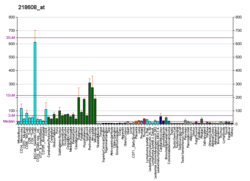ATP13A2
Probable cation-transporting ATPase 13A2 is an enzyme that in humans is encoded by the ATP13A2 gene that is involved in the transport of divalent transition metal cations.[5][6][7] It appears to protect cells from manganese[8] and zinc toxicity,[9] possibly by causing cellular efflux and/or lysosomal sequestration; and from iron toxicity, possibly by preserving lysosome integrity against iron-induced lipid peroxidation.[10] However, it potentiates the toxic effects of cadmium and nickel on developing neurites,[11] and of the widely used herbicide paraquat[12] possibly by increasing polyamine uptake.[13]
Deficiency is associated with spastic paraplegia and Kufor-Rakeb syndrome, in which there is progressive parkinsonism with dementia.[14]
References
- GRCh38: Ensembl release 89: ENSG00000159363 - Ensembl, May 2017
- GRCm38: Ensembl release 89: ENSMUSG00000036622 - Ensembl, May 2017
- "Human PubMed Reference:". National Center for Biotechnology Information, U.S. National Library of Medicine.
- "Mouse PubMed Reference:". National Center for Biotechnology Information, U.S. National Library of Medicine.
- Schultheis PJ, Hagen TT, O'Toole KK, Tachibana A, Burke CR, McGill DL, Okunade GW, Shull GE (October 2004). "Characterization of the P5 subfamily of P-type transport ATPases in mice". Biochemical and Biophysical Research Communications. 323 (3): 731–8. doi:10.1016/j.bbrc.2004.08.156. PMID 15381061.
- Ramirez A, Heimbach A, Gründemann J, Stiller B, Hampshire D, Cid LP, Goebel I, Mubaidin AF, Wriekat AL, Roeper J, Al-Din A, Hillmer AM, Karsak M, Liss B, Woods CG, Behrens MI, Kubisch C (October 2006). "Hereditary parkinsonism with dementia is caused by mutations in ATP13A2, encoding a lysosomal type 5 P-type ATPase". Nature Genetics. 38 (10): 1184–91. doi:10.1038/ng1884. PMID 16964263.
- "Entrez Gene: ATP13A2 ATPase type 13A2".
- Tan J, Zhang T, Jiang L, Chi J, Hu D, Pan Q, Wang D, Zhang Z (August 2011). "Regulation of intracellular manganese homeostasis by Kufor-Rakeb syndrome-associated ATP13A2 protein". The Journal of Biological Chemistry. 286 (34): 29654–62. doi:10.1074/jbc.M111.233874. PMC 3191006. PMID 21724849.
- Tsunemi T, Krainc D (June 2014). "Zn²⁺ dyshomeostasis caused by loss of ATP13A2/PARK9 leads to lysosomal dysfunction and alpha-synuclein accumulation". Human Molecular Genetics. 23 (11): 2791–801. doi:10.1093/hmg/ddt572. PMC 4014186. PMID 24334770.
- Rinaldi DE, Corradi GR, Cuesta LM, Adamo HP, de Tezanos Pinto F (August 2015). "The Parkinson-associated human P5B-ATPase ATP13A2 protects against the iron-induced cytotoxicity". Biochimica et Biophysica Acta (BBA) - Biomembranes. 1848 (8): 1646–55. doi:10.1016/j.bbamem.2015.04.008. PMID 25912790.
- Podhajska A, Musso A, Trancikova A, Stafa K, Moser R, Sonnay S, Glauser L, Moore DJ (2012-06-29). "Common pathogenic effects of missense mutations in the P-type ATPase ATP13A2 (PARK9) associated with early-onset parkinsonism". PLOS ONE. 7 (6): e39942. Bibcode:2012PLoSO...739942P. doi:10.1371/journal.pone.0039942. PMC 3386943. PMID 22768177.
- Pinto F, Corradi GR, Hera DP, Adamo HP (February 2012). "CHO cells expressing the human P₅-ATPase ATP13A2 are more sensitive to the toxic effects of herbicide paraquat". Neurochemistry International. 60 (3): 243–8. doi:10.1016/j.neuint.2012.01.002. PMID 22265822.
- De La Hera DP, Corradi GR, Adamo HP, De Tezanos Pinto F (February 2013). "Parkinson's disease-associated human P5B-ATPase ATP13A2 increases spermidine uptake". The Biochemical Journal. 450 (1): 47–53. doi:10.1042/BJ20120739. PMID 23205587.
- Online Mendelian Inheritance in Man (OMIM): ATPase, TYPE 13A2; ATP13A2 - 610513
External links
- Human ATP13A2 genome location and ATP13A2 gene details page in the UCSC Genome Browser.
Further reading
- Hampshire DJ, Roberts E, Crow Y, Bond J, Mubaidin A, Wriekat AL, Al-Din A, Woods CG (October 2001). "Kufor-Rakeb syndrome, pallido-pyramidal degeneration with supranuclear upgaze paresis and dementia, maps to 1p36". Journal of Medical Genetics. 38 (10): 680–2. doi:10.1136/jmg.38.10.680. PMC 1734748. PMID 11584046.
- Di Fonzo A, Chien HF, Socal M, Giraudo S, Tassorelli C, Iliceto G, Fabbrini G, Marconi R, Fincati E, Abbruzzese G, Marini P, Squitieri F, Horstink MW, Montagna P, Libera AD, Stocchi F, Goldwurm S, Ferreira JJ, Meco G, Martignoni E, Lopiano L, Jardim LB, Oostra BA, Barbosa ER, Bonifati V (May 2007). "ATP13A2 missense mutations in juvenile parkinsonism and young onset Parkinson disease". Neurology. 68 (19): 1557–62. doi:10.1212/01.wnl.0000260963.08711.08. PMID 17485642.
This article is issued from Wikipedia. The text is licensed under Creative Commons - Attribution - Sharealike. Additional terms may apply for the media files.




